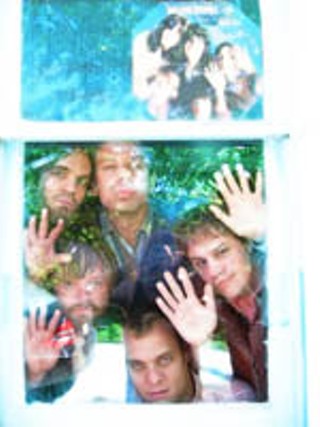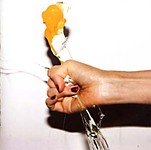Under the Covers
Austin rockers return to their roots
By Darcie Stevens, Fri., May 14, 2004

"Do you want to hear a cover or an original?" Elliott Smith would often ask near the end of his shows. Eager fans would roar in unison, and he would strum the opening bars of John Lennon's "Jealous Guy," Big Star's classic "Thirteen," or Bocephus' "All My Rowdy Friends (Have Settled Down)."
Everybody loves a cover song, no matter what kind. Geoff Peveto of local poster art coalition Factor27 is fanning the flames of this giddy crush, gathering three of Austin's finest interpreters of rock to perform nothing but other people's songs. Moonlight Towers, Li'l Cap'n Travis, and Grand Champeen are mingling at the Parish this Friday for a whole evening of rollicking mimicry. After years of stigma attached to such appropriation, rock & roll is coming out from under the covers.
Friday's program flamboyantly underscores this turning of the tide. "Retromania has fully taken hold," offers Grand Champeen guitarist Michael Crow. "A lot of bands want to establish their cred by proving they know 'x' song."
For many musicians and fans alike, this is unknown territory. A full decade of indulgent attitude and self-conscious artiness in indie rock pushed the idea of devil-may-care fun to the verge of extinction.
Good bands don't have good times, we were taught, at least not onstage. The last few years, thankfully, have brought a renewed wave of showmanship, an emphasis on entertainment over craftsmanship, and an urging to actually connect with the audience – and covers have become a logical focal point. It's as though rock has come full circle.
From the Mats Up
"It seems like in the Fifties and Sixties everybody did each other's songs," Moonlight Towers frontman and songwriter James Stevens says. "Nobody does that anymore."
The Rolling Stones' debut album, England's Newest Hit Makers, was almost completely composed of old R&B covers. Early on, the Beatles were as well known for the Topnotes' "Twist and Shout" and Smokey Robinson's "You've Really Got a Hold on Me" as for their own songs. And The Who did James Brown nearly as well as the godfather himself.
But covers were always more welcome onstage than on record. Performances rode on familiarity as opposed to originality. Bands would inadvertently compete through versions of Billy Roberts' "Hey Joe" or Chuck Berry's "Johnny B Goode."
"All the bands we liked growing up played covers," Grand Champeen singer/guitarist Channing Lewis explains. "The Replacements were known to play entire shows of covers, and people went home furious." However dubious the quality of those intensely liquored Replacements gigs, it is notable that the emphasis was on the show, not the songwriting.
Westerberg and company's shenanigans struck a special chord in Central Texas. In fact, when Austin rockers began to throw their own impromptu cover nights in the early Eighties, they were dubbed "hoot nights" in homage to the Mats' second LP, Hootenanny. These hoot nights multiplied over time to become an important pincushion in the fabric of the local music community (see "Who Gives a Hoot," see below).
"Hoot nights are another thing," Towers guitarist Jacob Schulze shakes his head apprehensively. "They seem like a good idea, but oftentimes you just sit around and watch people murder good songs, and it's just dreadful." But there is another side to that coin. Hoot nights gave bands like Grand Champeen a reason to learn many of their current crowd favorites. "And, frankly," Lewis admits, "we learned a little bit about ourselves in doing so."
And the bulb lights up with the real majesty behind cover songs: Sometimes one discovered tune can influence a band or musician more than years of slaving over their own material.
"When you're trying to learn a song and break it down, you learn what goes into those recordings," Matt Kinsey, one of Li'l Cap'n Travis' clan, believes.
"I think it makes your songwriting better," Schulze concurs. "You get to see the building blocks of all these different songs because you have to sit there and figure them out. Stuff you might not normally pay attention to when casually listening is stuff you can totally steal later." Well, that's one way of looking at it.
Room to Breathe
"We know very well that if you play a cover often enough and well enough, people start to want to hear that more than they want to hear your own stuff. It's a double-edged sword, and it can come back to haunt you," Champeen's Lewis says. "The Gourds know all about that."
There are myriad possibilities as to why the Nineties saw a void of covers. Fear is certainly one of them – fear of artistic forgery as well as blatant admission of influence.

"Proficiency skills, too, in that era kept a lot of people from doing covers I think," explains GC bassman Alex Livingstone. He mentions DIY darlings Pavement with a grimace. "They could've done 'Dead Flowers.' Sure, who can't? But they think they're too smart."
A too-cool-for-school hipster attitude pervaded the last decade. Indie rock became the new punk rock of sorts. The rebellion, drug use, and depression were all there, but the emphasis switched from enthusiastic stage shows to introspective songwriting.
"I guess it comes down to if you want to be all cool and be up there with laptops and black sweaters and dyed black hair," quips Schulze, "or do you just want to be a bar band and have fun and play stuff that people like?"
Prior to the 21st century's well-publicized "return to rock," there wasn't really a need for covers of Seventies classic songs. Nineties musicians were influenced by the previous decade for the most part, and that bridge hadn't yet begun to burn.
"There's a time element to covering a song," warns Lewis. "It's OK in 2004 to do a Pixies cover or a Dinosaur Jr. cover, but in the Nineties if you did that, it would've just been awful." Hence the tabling of covers. There were exceptions – Nirvana's Vaselines and Meat Puppets unearthings shone brightly – but it was a sad time for unemployed songwriters.
That is, unless that songwriter had a knack for irony. "In the early Nineties you would have a loud band play John Denver's 'Annie's Song,' and it would be kind of like you were making fun of it," LCT's Kinsey says, "but now we can actually admit that we like it."
The Restoration
Now the wall between creative appropriation and covers for amusement's sake has crumbled. Bands are beginning to embrace the spectacle of rock & roll revivalism once again, and the fans are treating it like barbecue on a midsummer day: They just can't get enough of this hot, sweaty, fatty indulgence.
The trickiest thing of all is choosing a musical sauce for that meat, because without the proper combination, the flavor is ruined.
"A loose policy is that we tend to do songs that we like a lot that you can't really hear that band do anymore live," GC's Crow says. Schulze reiterates, "It's not like we're gonna do the same eight classic rock songs they play on Z102, but it's just songs we like." A good rule of thumb: What's striking to the musician is attractive to the core fans – usually.
"It's a good way to get the crowd back if you lose them," observes Li'l Cap'n Travis beatman Mandon Maloney. "Everybody likes them."
It's not an elaborate ploy to dupe the crowd or to belie the power of originality, but playing a familiar lyrical arrangement or even an eminent drumbeat amplifies the power of expression.
"It's like a language," Schulze explains, "because later we'll have a new song and say, 'Let's Stones this one out.'"
That river flows both ways – shaping new songs through tried-and-true techniques, and then molding a pre-existing song through a band's unique artistic voice.
"When you play it long enough, it kind of turns into your own song," Stevens says. Moonlight Towers has integrated a revolving trifecta of covers – the Beatles' "Dig a Pony," the Stones' "Moonlight Mile," and Big Star's "September Gurls" – and a smattering of others into their already-entertaining set, with smashing results.
"The more you expose yourself to, the more you're able to assimilate into what you're trying to do," emphasizes Lewis. "Whether it's conscious or not, I imagine it has to have affected us to some extent."
A band, just as an individual, is incapable of fully distancing itself from the past. Few things can damage an artist more than trying too hard to dodge their own shadow.
Though there remains a line to cross – cover bands are still just novelty acts best-suited to weddings, sleazy metal joints, and Vegas – it is indeed blurring, and decades past are resurfacing in very conversant ways.
"I would definitely say there's a retro disease going around that's opened the door to songs from the Seventies," restates Lewis. "Maybe that's a problem, but I don't know. If people are having fun, then that's OK." Isn't that the point after all? ![]()
The covers night with Moonlight Towers, Li'l Cap'n Travis, and Grand Champeen is Friday, May 14, at the Parish.








